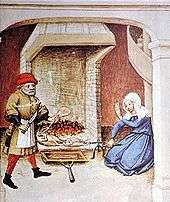Smoke canopy
A smoke canopy is a device hung over a fire to gather the smoke[1] and vent it through a wall or roof.

Fireplaces were not used during much of the Middle Ages, because there were no chimneys, which were not invented and popularized until the 12th century. Most fires for heating were placed on hearths in the middles of rooms, and the smoke was allowed to rise to vents in the roof or high in walls. Smoke canopies provided an alternative, gathering the smoke above a fire and venting, usually through a wall clearing the living area from harmful chemicals.
Most of the pictures we have of medieval smoke canopies show them being used in kitchens. They usually appeared over hearths that were placed against stone walls. Some were over free standing hearths, but this required special venting of the smoke.
Fire canopies are used to this day, especially in summer houses and mountain lodges as an alternative to expensive fireplace.[2]
See also
- See Exhaust hood for modern stove hoods
References
- http://www.fs.fed.us/database/feis/plants/forb/geutri/all.html
- Estyn Evans, E. (January 2000). Irish Folk Ways. ISBN 9780486414409.